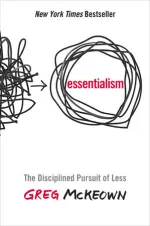Greg McKeown has spent the last 15 years obsessed with one question: What is it that keeps capable, driven people from breaking through to the next level? To his surprise, he found the answer to be success. He first observed this while working with executives teams in Silicon Valley, where he noticed that when the teams where focused on a few essential things, those actions led to success. But success brought along new options and opportunities, and taking on those opportunities often diluted the focus that led to success in the first place. McKeown found that success can be a catalyst for failure.
In his revealing new book, Essentialism: The Disciplined Pursuit of Less, McKeown debunks the myth that “we can do it all.” We can’t. We are constantly juggling an ever-growing set of professional and personal responsibilities. Despite ourselves, we continue to take on more. We say yes because we feel we have to, not because we want to. As a result, we feel overworked and underutilized. Busy, but not productive. McKeown argues that what is needed in order to achieve greater productivity, success, and live more fulfilling lives is to remain focused on the few essentials and getting rid of the trivial many. Do less but better. That is the definition of essentialism.
Essentialism is not a time-management strategy or a productivity technique. It is a systematic discipline for discerning what is absolutely essential, then eliminating everything that is not, so everyone can make the highest possible contribution toward the things that really matter.
By applying more selective criteria for what is essential, the disciplined pursuit of less empowers people to reclaim control of their own choices about where to spend their precious time and energy — instead of giving others the implicit permission to choose for them. “If we don’t prioritize our lives, someone else will,” says McKeown.
The book offers readers an engaging narrative, based on the author’s research and his work with top companies and individuals that lays out a convincing argument for leading the essentialist life, and he offers a roadmap that explains how to incorporate essentialism into their lives. “You can think of this book doing for your life and career what a professional organizer can do for your closet,” McKeown writes. “In the same way that our closets get cluttered … so do our lives get cluttered as well-intended commitments and activities we’ve said yes to pile up.”
